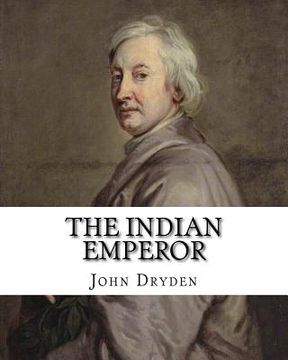The Indian Emperor By: John Dryden: The Indian Emperour, or the Conquest of Mexico by the Spaniards, being the Sequel of The Indian Queen is (en Inglés)
Reseña del libro "The Indian Emperor By: John Dryden: The Indian Emperour, or the Conquest of Mexico by the Spaniards, being the Sequel of The Indian Queen is (en Inglés)"
The Indian Emperour, or the Conquest of Mexico by the Spaniards, being the Sequel of The Indian Queen is an English Restoration era stage play, a heroic drama written by John Dryden that was first performed in the Spring of 1665. The play has been considered a defining work in the subgenre of heroic drama, in which "rhymed heroic tragedy comes into full being."As its subtitle indicates, the play deals with the Spanish conquest of the Aztec Empire under Hernan Cortes. Performance: The premiere production was staged by the King's Company at the Theatre Royal, Drury Lane; it featured Michael Mohun as the Emperor, Charles Hart as Cortez, Edward Kynaston as Guyomar, Nicholas Burt as Vasquez, William Wintershall as Odmar, William Cartwright as the Priest, and Anne Marshall as Almeria. The original production employed a "gorgeously feathered cloak" that Aphra Behn had brought back from Surinam, along with "glorious wreaths for...heads, necks, arms, legs." Dryden spiced his play with crowd-pleasing features, including incantations and conjured spirits, and an elaborate grotto scene with "a Fountain spouting." On opening night, Dryden had a program distributed to the audience, on the connection between this play and his earlier The Indian Queen (a collaboration with his brother-in-law Sir Robert Howard). When the Duke of Buckingham and his collaborators satirised Dryden in The Rehearsal (1671), they had their Dryden-substitute Bayes say "that he had printed many reams to instill into the audience some conception of his plot." The play was a major popular success, and was revived in 1667, with Nell Gwyn as Cydaria and Mary Knep in the role of Alibech. Samuel Pepys saw a performance; though he was an admirer of Gwyn, he condemned her performance in the role of the Emperour's daughter, calling it "a great and serious part, which she do most basely." The play was also given an amateur performance at Court in 1668, which included James Scott, 1st Duke of Monmouth and his Duchess in the cast. Pepys criticised the elite cast as mostly "fools and stocks"-though he did not actually see the production in question................. John Dryden (19 August [O.S. 9 August] 1631 - 12 May [O.S. 1 May] 1700) was an English poet, literary critic, translator, and playwright who was made England's first Poet Laureate in 1668. He is seen as dominating the literary life of Restoration England to such a point that the period came to be known in literary circles as the Age of Dryden. Walter Scott called him "Glorious John". Early life: Dryden was born in the village rectory of Aldwincle near Thrapston in Northamptonshire, where his maternal grandfather was rector of All Saints. He was the eldest of fourteen children born to Erasmus Dryden and wife Mary Pickering, paternal grandson of Sir Erasmus Dryden, 1st Baronet (1553-1632), and wife Frances Wilkes, Puritan landowning gentry who supported the Puritan cause and Parliament. He was a second cousin once removed of Jonathan Swift. As a boy Dryden lived in the nearby village of Titchmarsh, where it is likely that he received his first education. In 1644 he was sent to Westminster School as a King's Scholar where his headmaster was Dr. Richard Busby, a charismatic teacher and severe disciplinarian.Having recently been re-founded by Elizabeth I, Westminster during this period embraced a very different religious and political spirit encouraging royalism and high Anglicanism. Whatever Dryden's response to this was, he clearly respected the headmaster and would later send two of his sons to school at Westminster. As a humanist public school, Westminster maintained a curriculum which trained pupils in the art of rhetoric and the presentation of arguments for both sides of a given issue. This is a skill which would remain with Dryden and influence his later writing and thinking, as much of it displays these dialectical patterns..............

